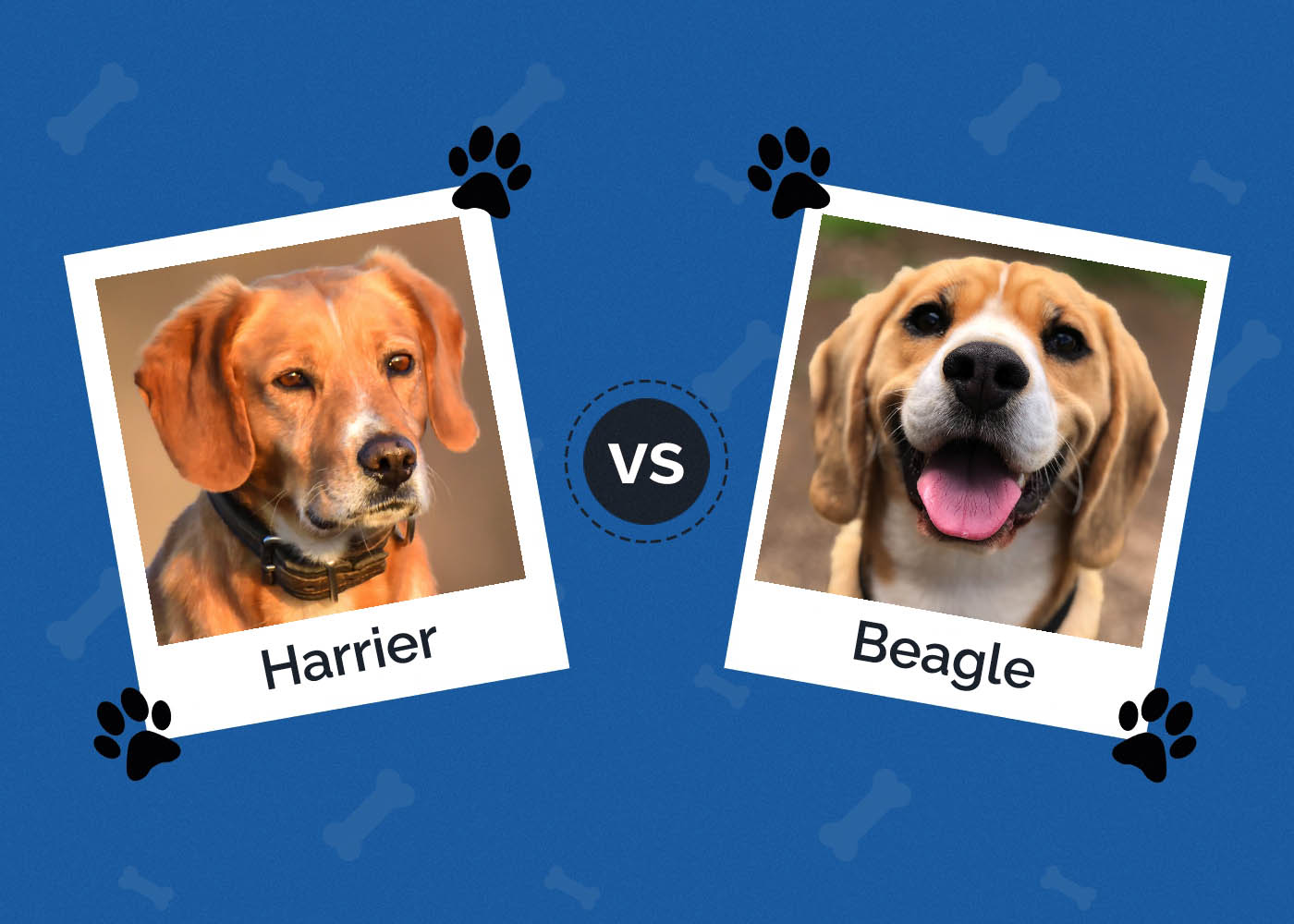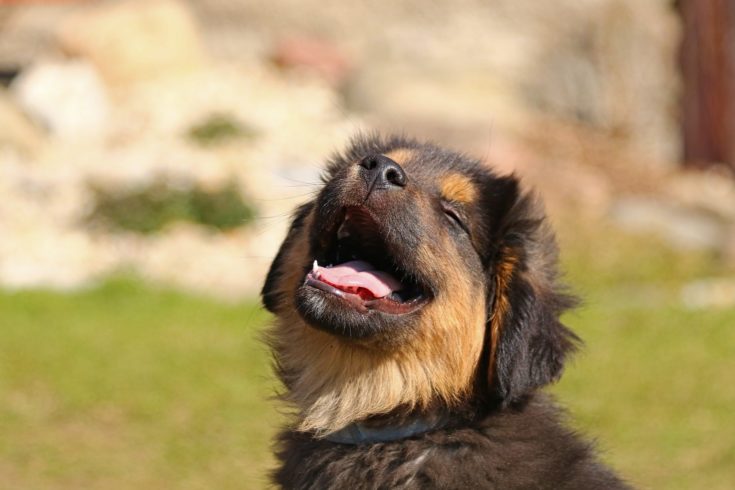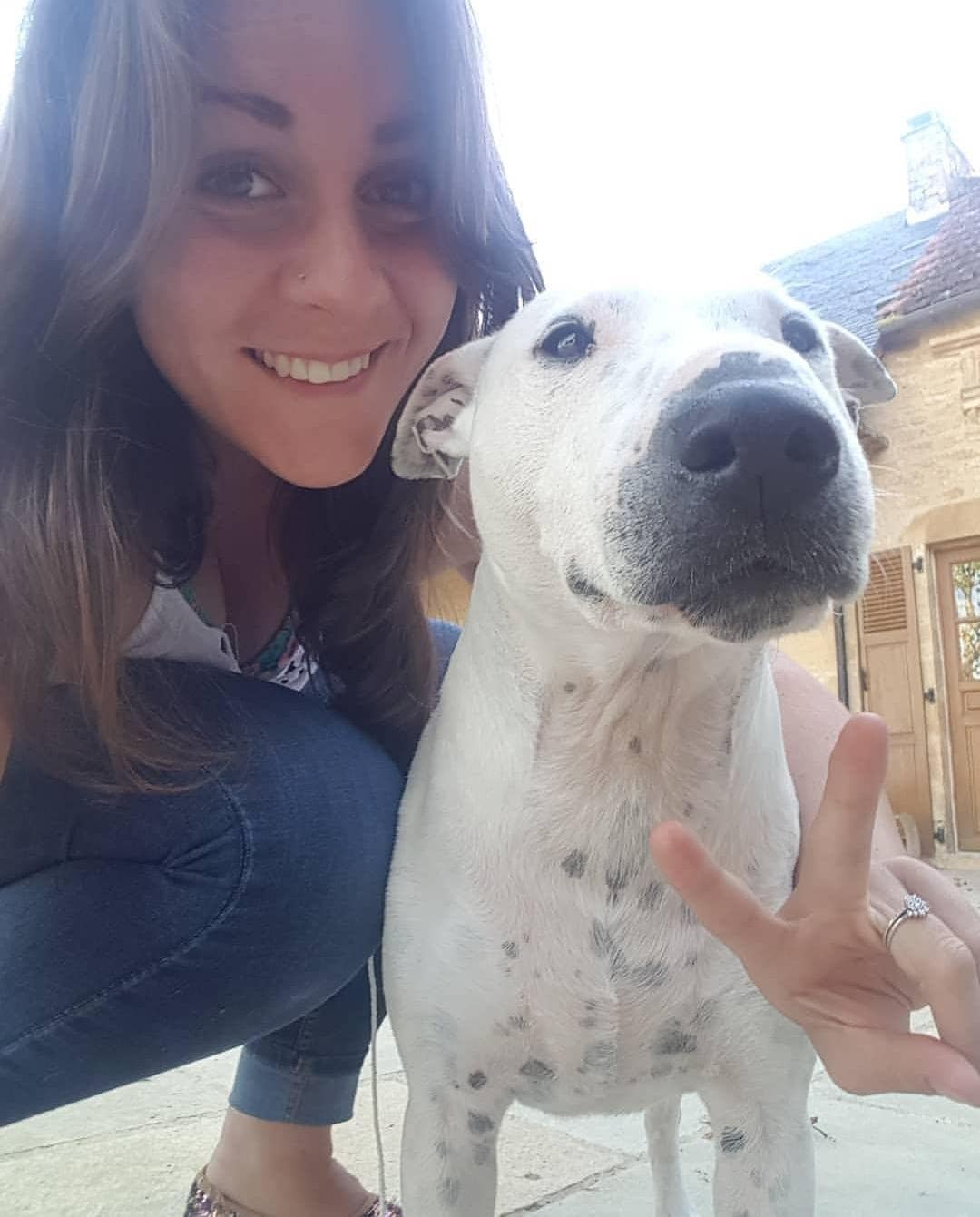Can Dogs Eat Cornbread? Vet-Reviewed Nutrition Facts & Safety

Updated on
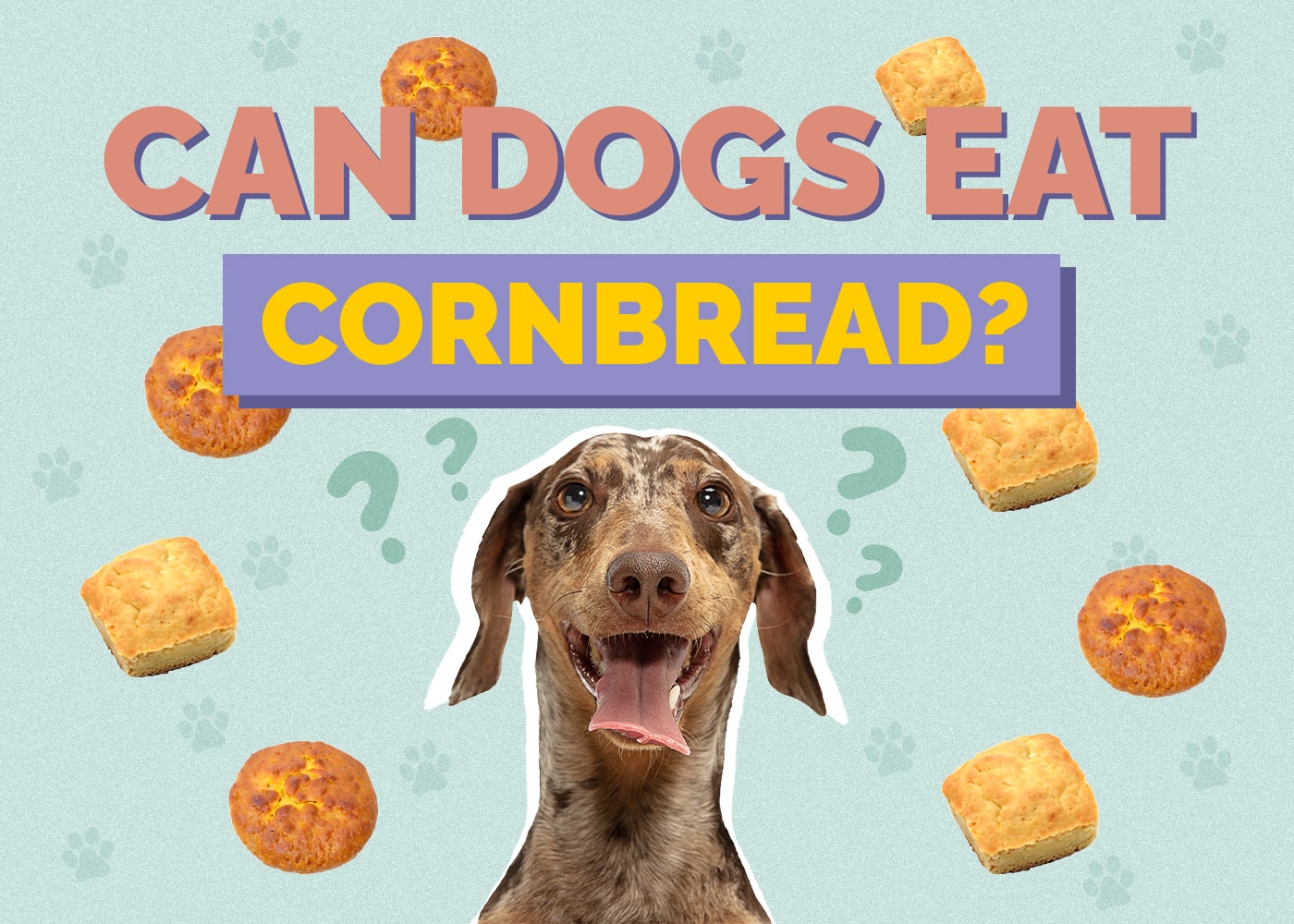
Click to Skip Ahead
Cornbread is a simple bread that is made primarily from cornmeal. It is common in the Southern USA, although there are variants found across the world, and was eaten by the Native Americans long before the settlers arrived. It may be considered a reasonably healthy food for humans. After all, it contains magnesium, iron, potassium, folic acid, and vitamins B6 and B12, among others.
While plain cornbread on its own is technically safe for most dogs, it shouldn’t be fed regularly to your pooch. Some of the nutrients in cornbread are not ideal for your dog, while others may even be toxic, such as garlic and raisins, depending on the recipe. However, while the bread product may be safely fed in small amounts and infrequently, it is high in carbs and should not be a regular dietary staple.
Processed and store-bought variants may also contain additional ingredients, additives, and preservatives that are not considered safe or healthy for your dog. Consult with your veterinarian about safe and appropriate treats and food for your dog, as dogs suffering with diabetes and other health issues should stay away from cornbread.

What Is Cornmeal/Cornbread?
Cornbread is a Native American cuisine. It is made from cornmeal, which is corn that has been finely ground down to the consistency of flour. It is usually unleavened or prepared with baking powder, which helps the bread rise. It is crumbly in texture and does not usually keep well, except where preservatives and other ingredients have been added.
The simplest cornbread consists of nothing more than cornmeal, water, and salt. The mixture is then prepared over a wood fire. Other recipes incorporate additional ingredients such as fat or wheat flour added to Johnnycakes or the fried onions that are added to hush puppies.
Vitamins and Nutrients
Cornbread’s primary ingredient is corn, which is high in starch, and contains insoluble fiber, vitamins and minerals. Fiber helps with digestive function. It is also considered good for weight loss because fiber passes through the body without being digested: it fills us up without adding calories to our daily intake.
As well as fiber, cornbread also includes phosphorus, potassium, selenium, calcium, magnesium, folic acid, iron, folates, and a host of vitamins including carotene (vitamin A precursor), B6, and B12. You will also find that cornbread contains some of the essential amino acids that help build protein, hormones, and other compounds in the body, boost the immune system, and maintain the body and its functions. However, it’s not a complete source of protein for dogs. Corn also contains essential fatty acids.
This list of vitamins and minerals looks incredible, at first glance. After all, many of them are considered just as important for dogs as they are for humans. However, underneath the relatively plain but pleasant flavor of cornbread lurk a few hidden truths.
High in Sugar
Cornbread is surprisingly high in carbs. A 60 gram piece may contain around 30 grams of carbs, out of which 10 grams is sugar. The high sugar content means that you can only safely feed a small amount of the food to your dog in a single sitting. Because you are feeding such a small amount, your dog will not get many of the benefits of the vitamins and nutrients that the cornbread offers. Complete and balanced high quality dog food should contain all the required nutrients and ingredients alongside adequate sugar content.
If you have store-bought cornbread, the sugar content is likely even higher. Despite being high in sugar, plain cornbread doesn’t taste all that sweet. Manufacturers include extra sugar to essentially turn it into a sweetened cake, and this means that while your dog might enjoy the flavor of the food, they will not gain any benefit from all this sugar.
Another more serious issue arises if the store-bought cornbread contains artificial sweeteners, such as xylitol, which is toxic to dogs. In that case, your dog should not taste any, and if they have by mistake, contact your vet straight away.

Allergies and Sensitivities
It should go without saying that the primary ingredient in cornbread is corn. Corn is a grain and although not that common, some dogs may suffer from grain allergies or sensitivity to this type of ingredient. The majority of pets with food allergies are allergic to animal proteins, not to plant proteins or grains, with corn rarely being a cause of allergies in dogs or cats, according to Tufts Clinical Nutrition Service.
Signs of food allergies in dogs usually include skin irritation, itching, licking, and scratching, with development of self-inflicted lesions, while in some cases it may exhibit as a stomach upset, vomiting, diarrhea, or excessive gas.
If you are concerned your dog may have a food allergy, speak to your vet, but be aware that it’s unlikely that your dog is allergic to corn or other types of grain. Some may advise you to offer grain free diets or treats instead, but consult with a veterinary professional first as there is an ongoing investigation into some grain free diets containing a high proportion of legumes instead, such as peas and lentils, and heart disease in dogs.
Avoid Store-Bought Cornbread & Corn Muffins
If your dog steals a small piece of cornbread from your plate, assuming that it is a plain recipe, there is no need to panic. This usually means making a basic version at home and avoiding store-bought alternatives.
Even where store-bought cornbread states it is made to a “traditional recipe”, it is common for it to include additives and preservatives, and you should avoid feeding these to your dog. Preservatives like sulfur dioxide and potassium sulfite, which are even included in some dog foods, can be harmful when fed in large quantities. Preservatives are typically found in higher quantities in human foods.
Another problem with store-bought versions of this food is that they can contain additional ingredients. Sweet variants of the food include extra sugar, artificial sweeteners like xylitol to sweeten it, while savory cornbread commonly includes ingredients like onion or garlic. Xylitol, onions, and garlic are all quite toxic for dogs and should not be fed in any quantity or at any time.
Some recipes may also include adding raisins in the cornbread, to make them into muffins, and this should also be strictly avoided, as raisins are toxic to dogs. Speak to your vet immediately if your dog has ingested any number of raisins or cornbread with xylitol, garlic, or onions.
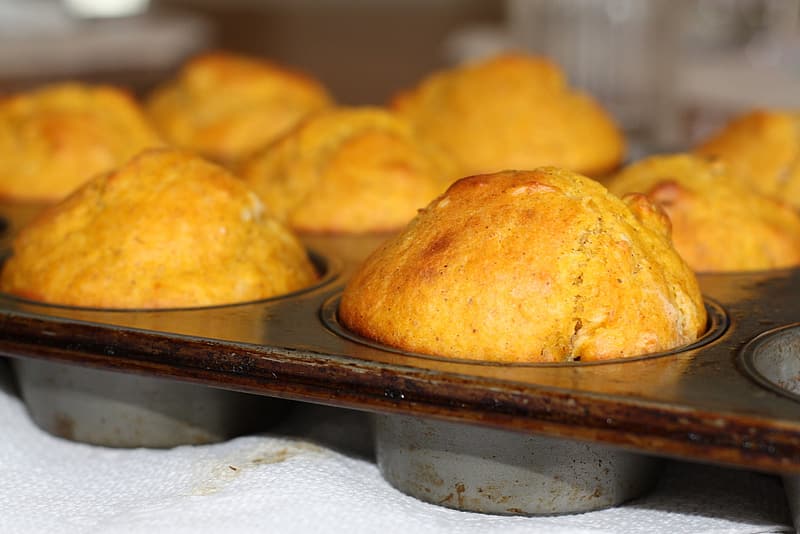
Feed in Moderation
Very plain, unsweetened cornbread is safe for most dogs when fed in moderation. Fortunately, cornbread is quite crumbly so it is easy to break down. Feed as a tiny tidbit or avoid feeding it altogether to be on the safe side.
Remember that cornbread is high in carbs, and this is not appropriate for some dogs, such as those suffering with diabetes. Consult with your vet on which treats, and particularly human food, can be offered to your pooch safely, but remember that besides their complete and balanced diet, they do not need any extra snacks or leftovers from your table in order to be happy.
Is Cornbread Safe for Dogs?
Cornbread can be considered a safe treat for most dogs, but only when fed in small amounts and infrequently. Also, you should avoid feeding cornbread that has any preservatives, additives, or additional ingredients. Particularly dangerous are recipes that contain xylitol, raisins, onions, or garlic, and if your dog ate any amount of cornbread with these ingredients, contact your vet straight away.




